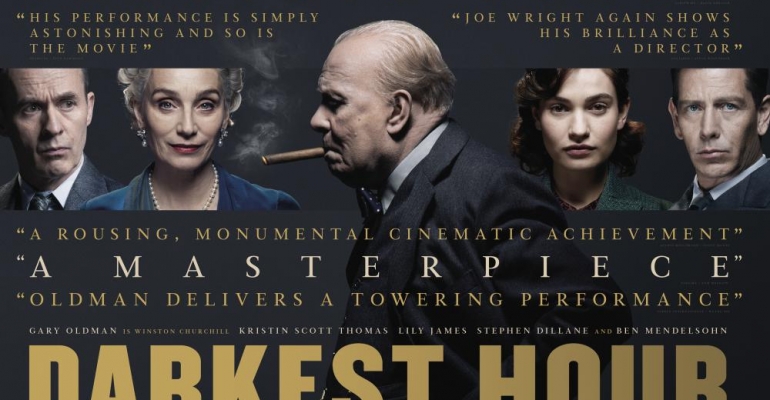
On Surviving Your Darkest Hour
As I walked into the cinema ahead of Darkest Hour, I was beginning to formulate a post about our need today for bold heroes, and wondering what that looks like in a time when we are more than ever aware of our leaders’ flaws. How much brokenness can we let slide for the greater good?
I still think that’s a line of thought worth pursuing, especially as there has only ever been one completely un-flawed human being, so like it or not we’re going to have to accept leaders who sin and err and make terrible mistakes. But what struck me more during the film was a very significant difference between these two men.
Hamilton was a loner. He worked his way out of poverty and obscurity to one of the highest positions in the brand new American government, but he did it pretty much alone. In the musical he is portrayed as a wild card - smarter than any of his contemporaries and (very) proud of it. He had a devoted wife, and a deep friendship with her sister, but didn’t, at least as the play presents it, have friends whose advice he respected or would seek. When his life hit crisis point, he was alone, with no one to turn to - not that he would have turned to them anyway. He was used to solving problems on his own, by his words, and he tried to write his way out of this problem too, with disastrous consequences.
Darkest Hour doesn’t follow Churchill’s entire adult life, but joins him for one significant episode: his first days as Prime Minister, just as the Nazis seemed set to wipe out all the allied troops and continue their unstoppable march across Europe. (There are slight spoilers for the film in what follows, but it’s so good it will be worth seeing anyway!)
What struck me more and more as the film went on was how significant the people around him were. In one early scene his wife, Clementine, is shown congratulating him on his appointment as Prime Minister and stating that the sacrifices she and their now-adult children have had to make for the sake of his career have been proved worthwhile (his son, Randolph, seems less than 100% in agreement with this statement!). The point is, Churchill wouldn’t be where he was today without Clemmie and her support. And this becomes ever clearer throughout the film. Clemmie is no saint, and their marriage is far from idyllic, but she loves him, knows him well, and is there to correct him when he errs and support him when he falters.
The central plot of the film concerns the British troops stranded at Dunkirk. The situation looks hopeless, and many in Churchill’s war cabinet advise - strongly - that Churchill pursue peace talks with Hitler, mediated by Mussolini. Churchill can’t bear the idea, but the pressure mounts, time is running out, and with little support, he begins to think he has no option.
But. There had to be a but, didn’t there? But at his lowest moment, when all seems lost, Churchill receives a visit. From the king.
King George VI has been portrayed throughout as sceptical of Churchill, and, as he admits himself, slightly scared of him. But as Churchill confides that he doesn’t see how we can go on fighting when no one believes in him, the king oh so quietly assures him “You have my support”. And on that one sentence, the movie - and history - turns.
Four little words from a trusted friend were enough to restore hope and instill courage, where both had seemed lost. The lives of hundreds of thousands of men were saved from the beaches of Dunkirk because of that conversation. The freedom of millions was ultimately purchased because of the events that followed. It took years. It took the promised blood, toil, tears and sweat. It came at a price (and the film does not shy away from acknowledging that price), but it came, nonetheless.
The credits rolled, the lights came up, and I left the cinema with a sombre crowd. I walked home down Whitehall, past Westminster, and wept with thankfulness that the flags that hung at rest, drifting languidly in the still, January sky were not swastikas.
I paused to look at one of my favourite monuments, that to the Women of World War II. It shows a selection of the uniforms worn by women called into action during the war - the land girls, Wrens, Waafs, bus drivers, code breakers, tea makers, morale raisers and more - hanging neatly on their pegs, no longer needed. I gave thanks for all those, great and small, who had played their part in winning my freedom.
Most of the posters for Darkest Hour show Churchill alone, but the lesson of the film is that alone he was almost overcome. Alone, he could not have led us to victory. Alone, he faced disaster. But with help - with his wife, his secretary, his ally, his king and his people - with them, he could stand tall and be the leader we needed.
Are you surrounding yourself with good people? Who is there to correct you when you get it wrong, to tell you the truth, and to pull you back on course? Who is there to pick you up when you’re down, to listen with quiet sympathy, to say ‘you have my support’?
And to whom are you being those things?
“Let us consider how we may spur one another on towards love and good deeds, not giving up meeting together, as some are in the habit of doing, but encouraging one another – and all the more as you see the Day approaching.” Hebrews 10:24-25